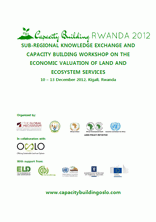Sub-Regional Knowledge Exchange and Capacity Building Workshop on the Economic Valuation of Land and Ecosystem Services

Land lies at the heart of the economic and social development of Africa; it is also central to its environmental sustainability, as well as to maintaining peace and security. It is in recognition of the centrality of land in African development that the African Union Commission (AUC), together with the Economic Commission for Africa (ECA) and the African Development Bank (AfDB) decided to join hands in 2006 in establishing the Land Policy initiative (LPI). From 2006 to 2009, through a highly participatory process informed by regional assessment studies and multi stakeholder consultations, the LPI successfully developed a Framework and Guidelines on Land Policy in Africa (F&G). This Framework and Guidelines (F&G) was endorsed in March 2009 by the joint AU Conference of African Ministers in charge of Agriculture, Land and Livestock.
The F&G provides a clear overview of the historical, political, economic and social background of the land question in Africa and elaborates on the role of land as a valuable natural resource endowment in attaining economic development and poverty reduction. Based on lessons and best practices identified in land policy development and implementation across Africa, it outlines how the land sector should perform its proper role in the development process. It promotes the need for a shared vision among all stakeholders of a comprehensive and coordinated land policy as a major factor in national development. It urges African governments to pay attention to the status of land administration systems, including land rights delivery systems and land governance structures and institutions, and to ensure adequate budgetary provision to land policy development and implementation. Its other fundamental purpose is to engage development partners in resource mobilization and capacity building in support of land policy development and implementation in Africa.